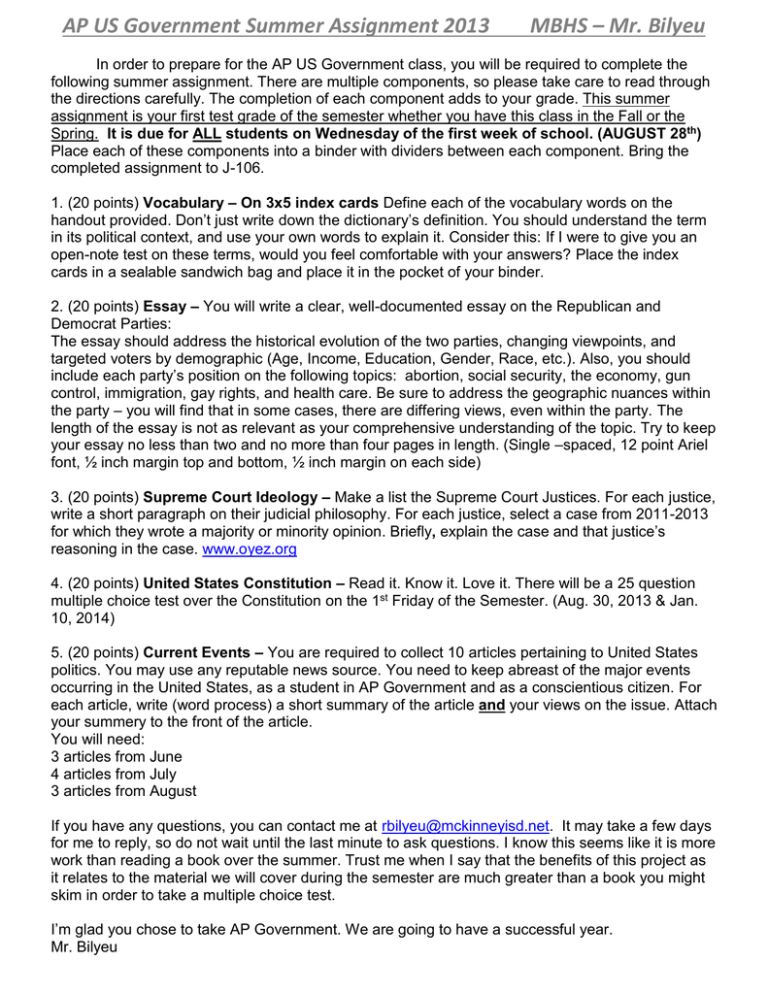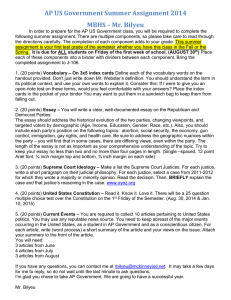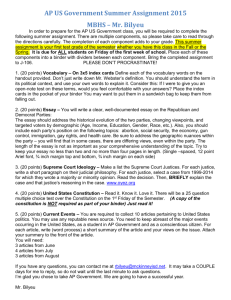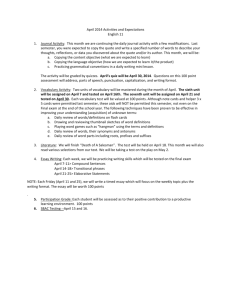AP US Government Summer Assignment 2013 MBHS – Mr. Bilyeu
advertisement

AP US Government Summer Assignment 2013 MBHS – Mr. Bilyeu In order to prepare for the AP US Government class, you will be required to complete the following summer assignment. There are multiple components, so please take care to read through the directions carefully. The completion of each component adds to your grade. This summer assignment is your first test grade of the semester whether you have this class in the Fall or the Spring. It is due for ALL students on Wednesday of the first week of school. (AUGUST 28th) Place each of these components into a binder with dividers between each component. Bring the completed assignment to J-106. 1. (20 points) Vocabulary – On 3x5 index cards Define each of the vocabulary words on the handout provided. Don’t just write down the dictionary’s definition. You should understand the term in its political context, and use your own words to explain it. Consider this: If I were to give you an open-note test on these terms, would you feel comfortable with your answers? Place the index cards in a sealable sandwich bag and place it in the pocket of your binder. 2. (20 points) Essay – You will write a clear, well-documented essay on the Republican and Democrat Parties: The essay should address the historical evolution of the two parties, changing viewpoints, and targeted voters by demographic (Age, Income, Education, Gender, Race, etc.). Also, you should include each party’s position on the following topics: abortion, social security, the economy, gun control, immigration, gay rights, and health care. Be sure to address the geographic nuances within the party – you will find that in some cases, there are differing views, even within the party. The length of the essay is not as relevant as your comprehensive understanding of the topic. Try to keep your essay no less than two and no more than four pages in length. (Single –spaced, 12 point Ariel font, ½ inch margin top and bottom, ½ inch margin on each side) 3. (20 points) Supreme Court Ideology – Make a list the Supreme Court Justices. For each justice, write a short paragraph on their judicial philosophy. For each justice, select a case from 2011-2013 for which they wrote a majority or minority opinion. Briefly, explain the case and that justice’s reasoning in the case. www.oyez.org 4. (20 points) United States Constitution – Read it. Know it. Love it. There will be a 25 question multiple choice test over the Constitution on the 1st Friday of the Semester. (Aug. 30, 2013 & Jan. 10, 2014) 5. (20 points) Current Events – You are required to collect 10 articles pertaining to United States politics. You may use any reputable news source. You need to keep abreast of the major events occurring in the United States, as a student in AP Government and as a conscientious citizen. For each article, write (word process) a short summary of the article and your views on the issue. Attach your summery to the front of the article. You will need: 3 articles from June 4 articles from July 3 articles from August If you have any questions, you can contact me at rbilyeu@mckinneyisd.net. It may take a few days for me to reply, so do not wait until the last minute to ask questions. I know this seems like it is more work than reading a book over the summer. Trust me when I say that the benefits of this project as it relates to the material we will cover during the semester are much greater than a book you might skim in order to take a multiple choice test. I’m glad you chose to take AP Government. We are going to have a successful year. Mr. Bilyeu AP US Government Summer Vocabulary 2013 MBHS – Mr. Bilyeu Affirmative Action Judicial Restraint Amicus curiae briefs Judicial Review Appropriations Bill Liberalism (Modern) Barron v. Baltimore Legislative Courts Block Grants Legislative Oversight Bureaucracy Limited Government Casework Marbury v. Madison Categorical Grants Narrowcasting Caucus (Congressional) Oversight (Congressional) Caucus (State Political Party) Political Party Civil Liberties Patronage Civil Rights Pork Barrel Spending Conservatism (modern) Primaries Cooperative Federalism Progressive Tax Democracy Proportional Tax Dual Federalism Public Policy Exclusionary Rule Reapportionment Exit Poll Regressive Tax Filibuster Rule of Four Fiscal Federalism Separation of Powers Formula Grants stare decisis Frontloading Ticket Splitting Gibbons v. Ogden Unfunded Mandates Gitlow v. New York writ of certiorari Incorporation Doctrine writ of habeas corpus Judicial Activism AP US Government Summer Assignment 2013 RUBRIC MBHS – Mr. Bilyeu Vocabulary – 20 points Political Party Essay – 15 Points Supreme Court Ideology – 20 Points Constitution Quiz – 25 Points Current Events – 20 Points Final Grade




